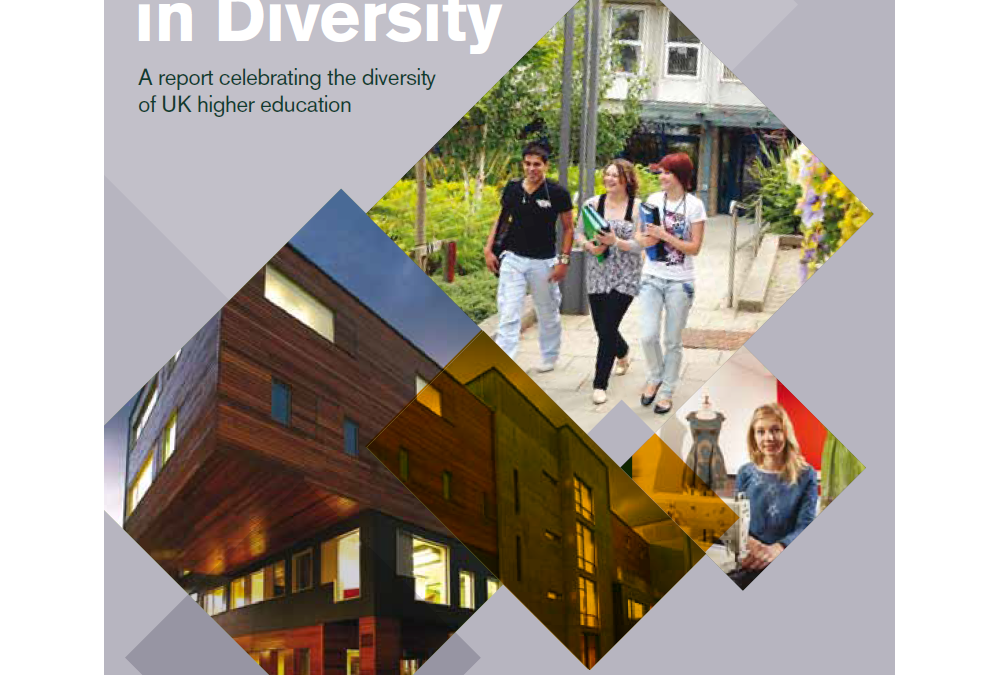On 1 July 2015, GuildHE published Excellence in Diversity. It was my first day in my new job. I could claim no credit whatever for its central, compelling case: that UK higher education is so strong, in part because it is so diverse.
I have though, used the argument many times since, including in a recent article. But after many years in the civil service, and witnessing hundreds of attempts to lobby ministers and other decision makers I know this truth: you can ask, but you won’t always get.
So more in hope than expectation, I asked for a duty to promote diverse higher education to be included in the Higher Education and Research Bill. I also suggested changes to the student finance rules that would make 2 year accelerated degrees more viable for universities.
But now, what we asked for has happened. As Jo Johnson said last week, “We have heard loud and clear the views that ‘choice’ doesn’t automatically mean ‘diversity’.”
Diverse higher education can’t be left to the market. You get diverse learning environments when funders and regulators take decisions to encourage and support them.
Competition and easier market entry will always deliver new providers in London. But if you want higher education that provides particular skills in a particular place – as part of regenerating a seaside town or supporting a new industrial cluster – then you need the capacity to plan and to make strategic investments.
Fees alone won’t support the industry links and unique teaching environment of specialist creative arts, performance or agricultural universities. The subjects cost more to teach than the fee cap but specialist providers can’t subsidise those courses from cheaper to deliver subjects in the way a large multi-faculty university can.
The Bill now makes clear the OfS duty to promote choice, includes choice amongst a diverse range of types of provider, higher education courses, and the means by which they are provided (such as accelerated courses, part-time study or distance learning). Talking about this amendment, Jo Johnson said “the OfS will be expected to consider, for example, specialist institutions and providers with distinctive characteristics, such as those of a denominational character, in making its decisions. And for the first time ever, the higher education regulator will have an explicit duty, set out in law, to consider different forms of learning.”
Diversity matters to students and to the economy. Smaller, regionally focused and more specialist institutions can offer an excellent student experience. Their human scale means they create a sense of community that contributes significantly to high levels of student satisfaction and low levels of student drop out.
Universities with particular specialisms have teachers and researchers who are often industry professionals with current business knowledge. They are attuned to industry developments and are able to adapt quickly and effectively to new skill requirements or structural changes in employment. They know how to translate research into market innovations.
And it’s never mattered more. The government’s Green Paper, Building our Industrial Strategy argues for a particular focus on place-based innovation and research that can respond to particular challenges. Higher education providers have a crucial role in improving skills and productivity right across the country.
GuildHE institutions are well placed to do this because they are embedded in regional economies and have the potential to act as creative hubs to deliver local innovation. If you want higher education as an integral part of the industrial strategy then you need the OfS promoting diversity.
I also argued that the Bill offered the chance to make bold changes on student finance and break down the barriers that stop HE providers innovating. Although several GuildHE members already offer accelerated degrees, it’s in spite of the student finance system, not because of it. If universities want to offer a full degree in just two years they face extra costs per year but they can’t recoup them: the maximum they can charge in fees is £18,000 compared to the £27,000 for a three-year degree.
Two year accelerated degrees won’t suit all students or all subjects. The evidence to date suggests they work best for older, highly motivated students with a clear career aim in mind. But with mature student numbers falling, they are an important tool for expanding student choice and supporting lifelong learning.
By taking a power that allows Parliament to set a higher fee cap for accelerated degrees, government has come up with a good answer. It means the total fee for a full degree done in 2 years could be a bit lower than the 3 year fee: providers can meet their costs, students can save on maintenance and, more importantly, the opportunity costs of a year’s delay entering the graduate labour market.
We said at the time that Excellence in Diversity was both a celebration and a caution: what was at risk if policy makers didn’t support difference in higher education. Well ministers have listened to the caution. And that is something to celebrate.

